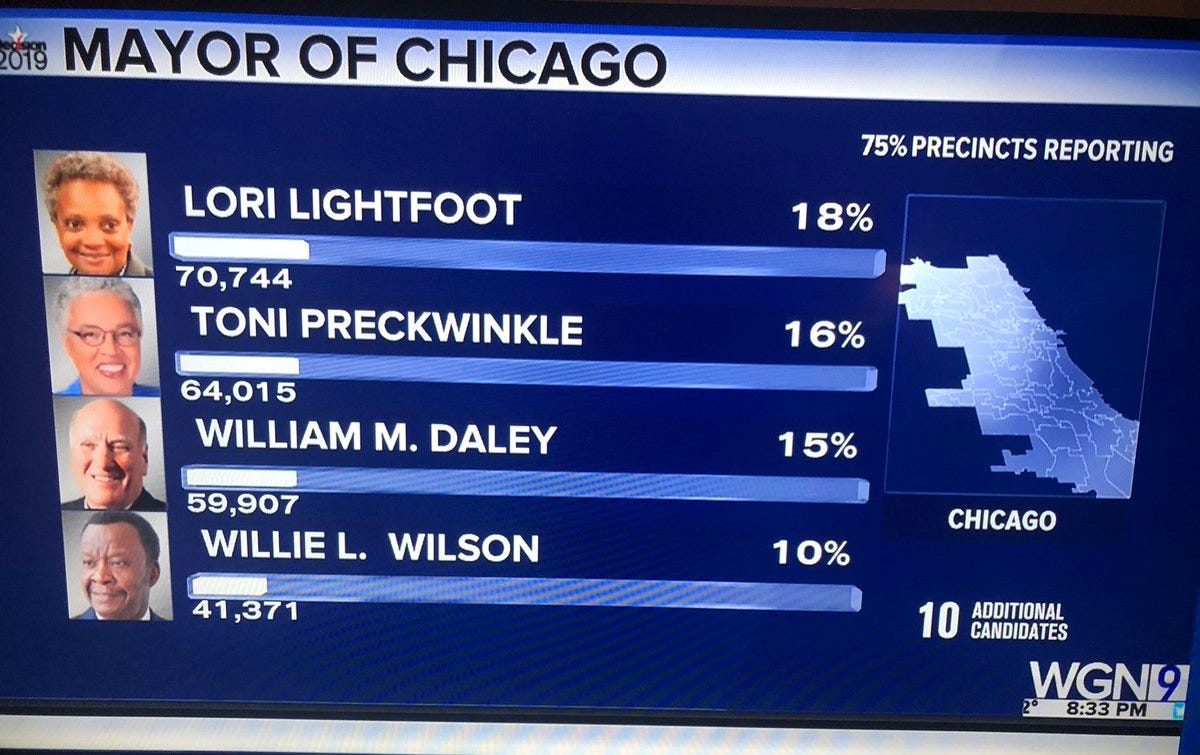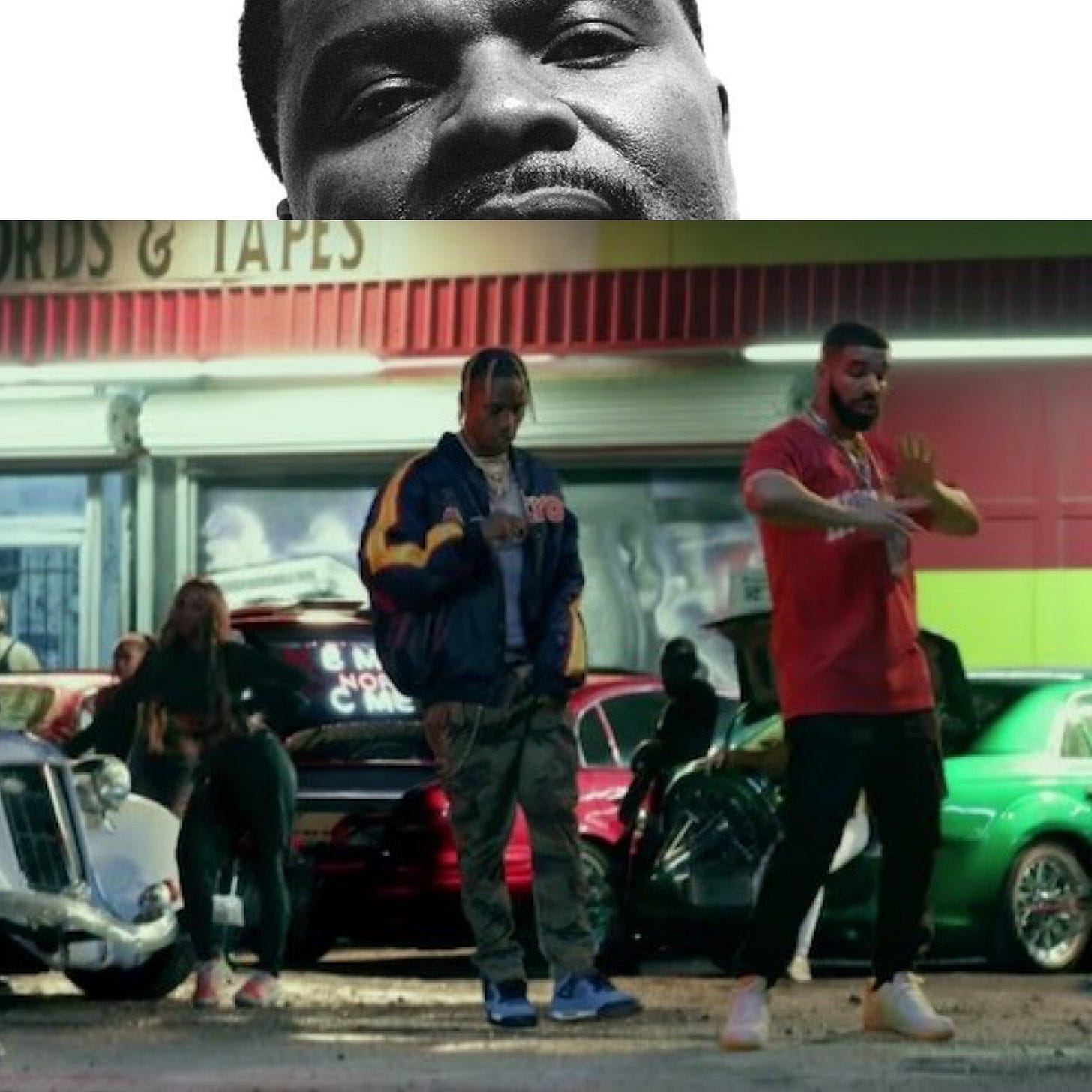#6: “Chicago is the most American of American cities.”

“Two schools of thought claim to understand Chicago`s rambunctious political history. The first contends that race explains it all. The second approach was summed up in the 1980s by a black ward committeeman: ''If race and politics compete in a tug-of-war at city hall, you can bet your bottom dollar that politics will come first.’’ - Prof. Ed Marciniak
✶ ✶ ✶ ✶
On Wednesday morning in his post-election address, Mayor Rahm Emanuel stated that Chicago’s mayoral election results Tuesday were “a statement of the character of this city”. While Chicago has had female leadership at City Hall— kind of wild that NYC and LA still can’t say the same, right? — and an African-American mayor (the immortal Harold Washington), either Lori Lightfoot or Toni Preckwinkle will make history as Emanuel’s successor, becoming the first black woman to serve as mayor in the 128-year history of Chicago.
He also said this:

Whether the soon-to-be ex-mayor realizes it or not, this quote is one of the truest things he’s said in his run as Chicago’s leader.
From the engineering to the social issues, the wealth inequality to the Board of Trade, real things that affect Americans all over happen in Chicago every day. Add the city's legacy as the unofficial capital of the Rust Belt — the result of 275 years of interconnected progress in organized labor, production and distribution — and the very real financial problems facing our deeply wounded-but-resilient region and the and the still-somehow booming opportunity that drew so many to this city, The point stands: Chicago’s history is America’s history.
Let me back up. Tuesday was a wild ride, y’all. The overall turnout for the general election was under 34%, a number that inspired frustration amongst many locally. For what it’s worth, I believe the low turnout isn’t solely caused by one thing, as I heard differing factors from several people across the city: Some assumed a runoff election was inevitable and chose to wait it out, some were simply overwhelmed with the amount of candidates (14!!!), some straight up just didn’t like anyone running.
The shock to most was that Bill Daley didn’t make the runoff. If you’re new here, the Daley Family is like Chicago’s answer to Manning family, except instead of throwing touchdown passes, they throw lucrative city contracts to friends and family members. Add to the fact that three out of the final 4 candidates were black and Chicago can officially say that we saved Black History Month 2019. (Being honest, between the R.Kelly indictment/generally everything about R.Kelly and the Dick Wolf wet dream that is the Jussie Smollett saga, it was on us to make it right anyway.)
Yes, it is hyperbolic to claim Chicago’s status at the forefront of American culture, but I offer that the city’s influence is much larger than you probably consider, especially if your only experience to our culture comes via TV news.
I believe Tuesday’s election should serve as an official trend forecast: America has changed and it behooves anyone working to engage a large population of Americans (you know, like people who work in marketing or advertising) to start actually paying attention to what people are saying outside of platforms like Twitter and Facebook.
Whether you’re running your own business or working in any creative space, you have to get outside. Your work will get better, you’ll gain opportunities that weren’t previously present, and odds are you’ll make better stuff that serves the larger population…you know, the ones who you’re burning money to reach right now with content that you wouldn’t even watch if you didn’t work there.
I end this with a promise: Change will happen. It’s ALREADY happening. It’s what happened last November in Congress, it’s what happened Tuesday in Chicago and odds are, it’ll happen again in a neighborhood near you. It’s the only constant.
Run with it or get run over.
YOUR HOMEWORK THIS WEEK:
If you really want to get your fill of Chicago politics this week, three of the best journalists we have here in town have got you covered.
Kim Bellware on Rahm
Mick Dumke: “The scene hardly had the look of history being made.“
Natalie Moore: “Black Chicago Has To Stop Chasing The Ghost Of Harold Washington”
TUNES:

I don’t have nostalgia for the 90’s, I have nostalgia for having the music be my first introduction to an act.
It makes sense, I am indeed a child of the 90’s album rollout and thus have strong feelings for a well-constructed narrative around my popular music. As the single-focused music industry has rendered the need for a strong narrative to move units less of a priority, it says something that some of the best music around these days has a strong narrative that helps listeners truly build a connection with the artists. Examples of modern albums with strong narratives: Lemonade, A Seat At The Table, every single Kendrick Lamar album. I miss it!
If you’re of a certain age and grew up listening to southern rap, you know the name J. Prince. Prince iss the shadow father looming over southern rap music, being the head honcho behind the south’s first legacy hip-hop label, Rap-A-Lot and having his hands in damn near everything. Traditionally, Prince never talked to press about…well, anything. So you can imagine many of our surprise when Prince released his autobiography last year. I felt like we collectively could have made a bigger deal about it.
With Prince being from Houston and having such a close relationship from Drake and Travis $cott, I took the best parts of Scorpion and ASTROWORLD with some audiobook clips from Prince himself to create a fun little narrative that makes the music hit just a bit harder to me:
What if Drake and Travis Scott released a joint album celebrating J. Prince’s legacy and Houston instead of their separate albums last year? It sounds impossible to consider, but celebrating the rich history of Prince’s influence (and ability to make the impossible happen, if you smell what I’m cooking) if anyone could do it, it would be him, right?


